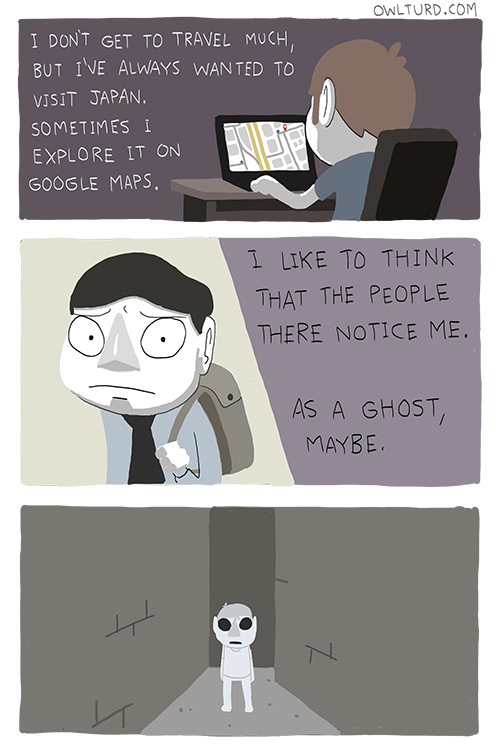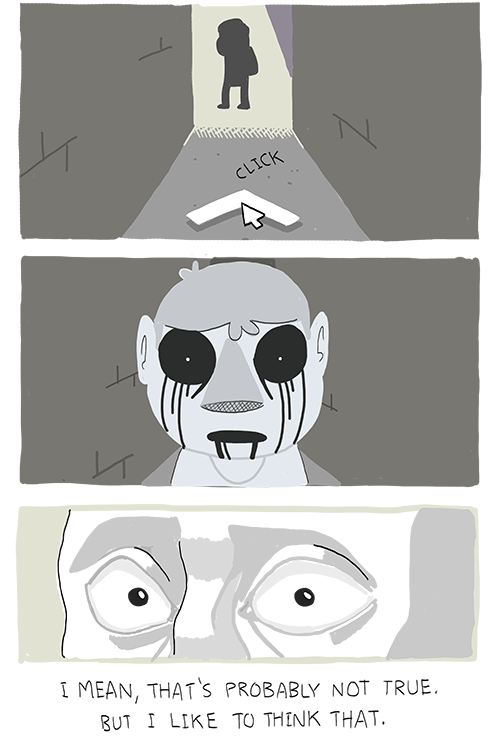
'Please Contact Us': It's Been a Tough Week for the Nobel Prize's Twitter Feed
Tales of temporary rejection from an organization not used to being ignored.


Thoughts I have instead of smart thoughts.
Owl Turd is rapidly becoming one of my favourite webcomics.
This may have been a Serial Experiments Lain episode synopsis.
This is essentially an AV exploit against Super Mario World that results in running the end game code. Watch the video. “…there’s a glitch that’s been known for a while, where Yoshi can end up in the “I have an item in my mouth” state, but not actually have an item in his mouth. When he spits out this nothingness, the game crashes. …That address did not contain code, and so the system crashed. But wait a second. What if, by some sheer coincidence, that address did contain code? The specific address dropped him in somewhere amongst various data for the game’s internal random number generator, and the random number generator can be manipulated in a TAS. Could the game be coerced into running arbitrary code?…”
I’ve been following this advice for many years now to the extent that I find myself rewriting text to make linking my nouns easier and shorter.
The one I wasn’t following that seems obvious only after I read it is to keep links towards the end of your text to allow users to follow the link once they’re done reading.
links at the end of the sentence allow users to take action faster
NICT Daedalus Cyber-attack alert system #DigInfo (by Diginfonews)
Someone has been watching too much Ghost in the Shell. I’d say someone has been watching too much Hackers but this actually looks cooler than their visualizations and also you can never watch too much of Hackers.
So this is another Stuxnet by Israel/US?
The analysis reinforces theories that researchers from Kaspersky Lab, CrySyS Lab, and Symantec published almost two weeks ago. Namely, Flame could only have been developed with the backing of a wealthy nation-state. … “It’s not a garden-variety collision attack, or just an implementation of previous MD5 collisions papers—which would be difficult enough,” Matthew Green, a professor specializing in cryptography in the computer science department at Johns Hopkins University, told Ars. “There were mathematicians doing new science to make Flame work.”

The conversation surrounding how to liberate HBO from its cable partners and create the entertainment utopia viewers have long desired has been fascinating.
The resulting analyses of the numbers has pretty much shown that the amount people are willing to pay is not nearly enough to…
Use of my old Hotmail account has really snuck up on me as I end up caring more and more about all of the services with which it is associated. The last straw is Windows 8 login, but previous straws include Xbox, Zune, SkyDrive, and my Windows 7 Phone. I like the features and sync'ing associated with the Windows Live ID, but I don't like my old, spam filled, hotmail email address on the Live ID account.
A coworker told me about creating a Live ID from a custom domain, which sounded like just the ticket for me. Following the instructions above I was able to create a new deletethis.net Live ID but the next step of actually using this new Live ID was much more difficult. My first hope was there would be some way to link my new and old Live IDs so as to make them interchangeable. As it turns out there is a way to link Live IDs but all that does is make it easy to switch between accounts on Live Mail, SkyDrive and some other webpages.
Instead one must change over each service or start over depending on the service:
Star Trek’s hypospray apparently already existed and has been patented since 1960.
So! Here is the trailer for a web series I’ll be hosting, where I chat with cool people over actual alcoholic drinks. We’ve shot a dozen of these so far and I am grateful to have been asked to host them. I got to have interesting conversations with strangers and friends alike.
It goes live on Monday 5/7!
Internet terms!
Astronaut endorses destroying the moon!
The best exchange on the IAmA:
Ghostshirts it’s been a dream for a long time now, do you think that we’ll actually be able to blow up the moon in our lifetime?
RonGaran I truly believe that we can accomplish anything we set our minds on. We only need the will to do it
By the URI RFC there is only one way to represent a particular IPv4 address in the host of a URI. This is the standard dotted decimal notation of four bytes in decimal with no leading zeroes delimited by periods. And no leading zeros are allowed which means there's only one textual representation of a particular IPv4 address.
However as discussed in the URI RFC, there are other forms of IPv4 addresses that although not officially allowed are generally accepted. Many implementations used inet_aton to parse the address from the URI which accepts more than just dotted decimal. Instead of dotted decimal, each dot delimited part can be in decimal, octal (if preceded by a '0') or hex (if preceded by '0x' or '0X'). And that's each section individually - they don't have to match. And there need not be 4 parts: there can be between 1 and 4 (inclusive). In case of less than 4, the last part in the string represents all of the left over bytes, not just one.
For example the following are all equivalent:
The bread and butter of URI related security issues is when one part of the system disagrees with another about the interpretation of the URI. So this non-standard, non-normal form syntax has been been a great source of security issues in the past. Its mostly well known now (CreateUri normalizes these non-normal forms to dotted decimal), but occasionally a good tool for bypassing naive URI blocking systems.
I've been working on the Glitch Helperator. It is a collection of tools and things I've put together for Glitch. It has a few features that I haven't seen elsewhere including:
Sarah and I have been enjoying Glitch for a while now. Reviews are usually positive although occasionally biting (but mostly accurate).
I enjoy Glitch as a game of exploration: exploring the game's lands with hidden and secret rooms, and exploring the games skills and game mechanics. The issue with my enjoyment coming from exploration is that after I've explored all streets and learned all skills I've got nothing left to do. But I've found that even after that I can have fun writing client side JavaScript against Glitch's web APIs making tools (I work on the Glitch Helperator) for use in Glitch. And on a semi-regular basis they add new features reviving my interest in the game itself.
“One in three people in Switzerland download unauthorized music, movies and games from the Internet and since last year the government has been wondering what to do about it. … The overall conclusion of the study is that the current copyright law, under which downloading copyrighted material for personal use is permitted, doesn’t have to change.” Wow, that sounds like almost reasonable and understandable copyright law.
A bug came up the other day involving markup containing <input type="image" src="http://example.com/.... I knew that "image" was a valid input type but it wasn't until that moment
that I realized I didn't know what it did. Looking it up I found that it displays the specified image and when the user clicks on the image, the form is submitted with an additional two name
value pairs: the x and y positions of the point at which the user clicked the image.
Take for example the following HTML:
<form action="http://example.com/">
<input type="image" name="foo" src="http://deletethis.net/dave/images/davebefore.jpg">
</form>http://example.com/?foo.x=145&foo.y=124.
This seemed like an incredibly specific feature to be built directly into the language when this could instead be done with javascript. I looked a bit further and saw that its been in HTML since at least HTML2, which of course makes much more sense. Javascript barely existed at that point and sending off the user's click location in a form may have been the only way to do something interesting with that action.
Possible combinations to shuffle a deck of cards is 8.0658X1067 compared to the number of times a deck of cards has been shuffled thus far in history 1.546X1023